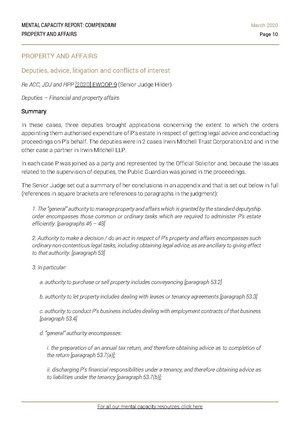Re ACC [2020] EWCOP 9
Appendix: Summary of conclusions
1. The “general” authority to manage property and affairs which is granted by the standard deputyship order encompasses those common or ordinary tasks which are required to administer P’s estate efficiently. [paragraphs 46 - 48]
2. Authority to make a decision / do an act in respect of P’s property and affairs encompasses such ordinary non-contentious legal tasks, including obtaining legal advice, as are ancillary to giving effect to that authority. [paragraph 53]
3. In particular:
- a. authority to purchase or sell property includes conveyancing [paragraph 53.2]
- b. authority to let property includes dealing with leases or tenancy agreements [paragraph 53.3]
- c. authority to conduct P’s business includes dealing with employment contracts of that business [paragraph 53.4]
- d. “general” authority encompasses:
- i. the preparation of an annual tax return, and therefore obtaining advice as to completion of the return [paragraph 53.7(a)];
- ii. discharging P’s financial responsibilities under a tenancy, and therefore obtaining advice as to liabilities under the tenancy [paragraph 53.7(b)];
- iii. applying P’s funds so as to ensure that the costs of his care arrangements are met, and therefore dealing with employment contracts of directly employed carers [paragraph 53.7(c)]
4. Specific authority is required to conduct litigation on behalf of P [paragraph 51] except where the contemplated litigation is in the Court of Protection in respect of a property and affairs issue [paragraph 52.4] or to seek directions in respect of a welfare issue [paragraph 52.10].
5. Where a deputy has authority to make a decision / do an act in respect of P’s property and affairs, such authority encompasses steps in contemplation of contentious litigation in the realm of that authority up to receiving the Letter of Response but no further [paragraph 54.4]. In particular:
- a. authority to let property encompasses taking steps to form a view as to whether there are grounds to evict a tenant of such property [paragraph 53.13];
- b. “general” authority to manage P’s funds includes taking steps to form a view about whether a debt said to have been incurred by P is properly payable pursuant to section 7 of the Mental Capacity Act 2005 [paragraph 53.13];
- c. “general” authority to manage P’s funds includes steps up to but not including the delivery of a letter of appeal in respect of a decision that P is not eligible for continuing healthcare funding [paragraph 54.8(a)];
- d. where authority encompasses steps in contemplation of contentious litigation, that includes obtaining Counsel’s opinion. [paragraph 54.5]
6. “General” authority of a property and affairs deputyship order does not encompass seeking advice or other steps preliminary to litigation in respect of welfare issues; it does encompass making an application to the Court of Protection for further directions /specific authority in respect of welfare issues. [paragraph 54.6]
7. “General” authority of property and affairs deputyship does not encompass steps in contemplation of an appeal against the decision of an Education, Health and Care Plan. [paragraph 54.8(b)]
8. If circumstances arise where the protection of P’s interests requires action to be taken so urgently that prior authority to litigate cannot reasonably be obtained, a deputy proceeds at risk as to costs but may make a retrospective application for authority to recover costs from P’s funds. There is no presumption that such application will be granted - each application will be considered on its merits. [paragraph 55]
9. Where a deputy wishes to instruct his own firm to carry out legal tasks, special measures are required to address the conflict of interest:
- a. the deputy may seek prior authority [paragraph 56.7(a) - (e)];
- b. the deputy is required to seek - in a manner which is proportionate to the magnitude of the costs involved and the importance of the issue to P - three quotations from appropriate providers (including one from his own firm), and determine where to give instructions in the best interests of P [paragraph 56.7(f)(i)];
- c. the deputy must seek prior authority from the Court if the anticipated costs exceed £2 000 + VAT;
- d. the deputy must clearly set out any legal fees incurred in the account to the Public Guardian and append the notes of the decision-making process to the return. [paragraph56.7(f)(iv)]
10. Specific authority is required to use P’s funds to pay a third party’s legal costs, even if those costs relate to litigation for the benefit of P. [paragraph 57]
11. The Official Solicitor is willing to act as litigation friend for P without charge in any of the existing classes of cases in which she acts where her usual criteria are met. [paragraph 58]
12. If P has capacity to give instructions for particular work, he will also have capacity to agree the costs of that work. [paragraph 59]
Essex
This case has been summarised on page 10 of 39 Essex Chambers, 'Mental Capacity Report' (issue 102, March 2020).Essex search
This case's neutral citation number appears in the following newsletters:Full judgment: BAILII
Subject(s):
- Deputyship cases🔍 Older deputyship cases can still be found in Category:Other capacity cases
Date: 27/2/20🔍
Court: Court of Protection🔍
Judge(s):
- Hilder🔍
Parties:
Citation number(s):
What links here:Published: 3/7/20 22:27
Cached: 2024-04-25 11:58:48
